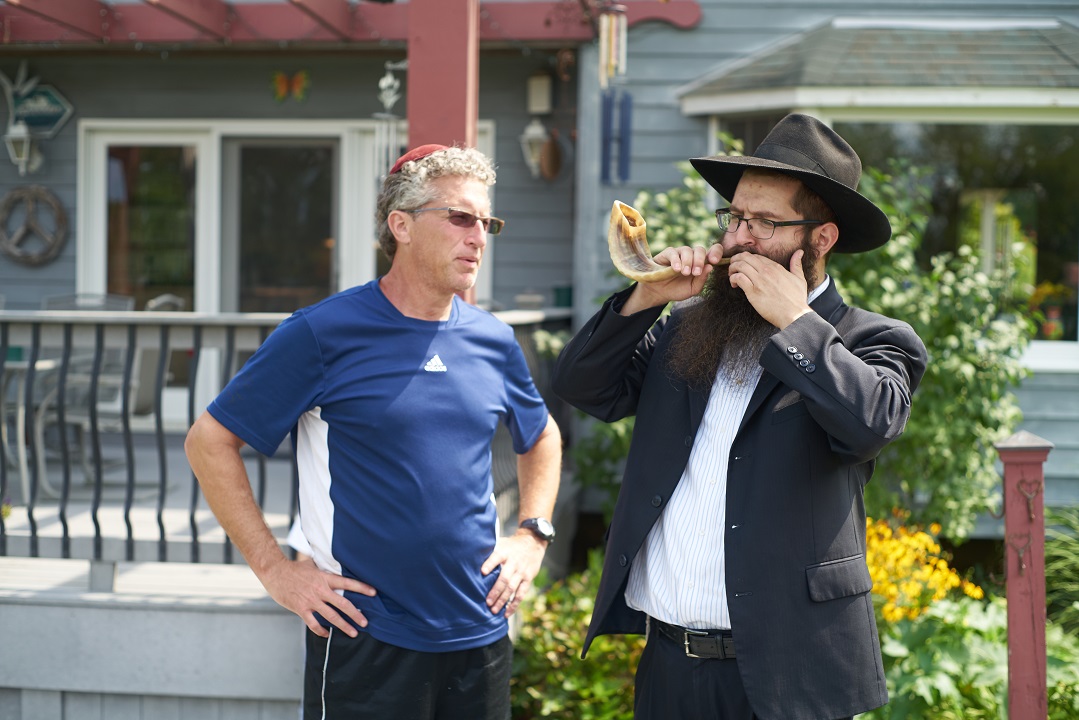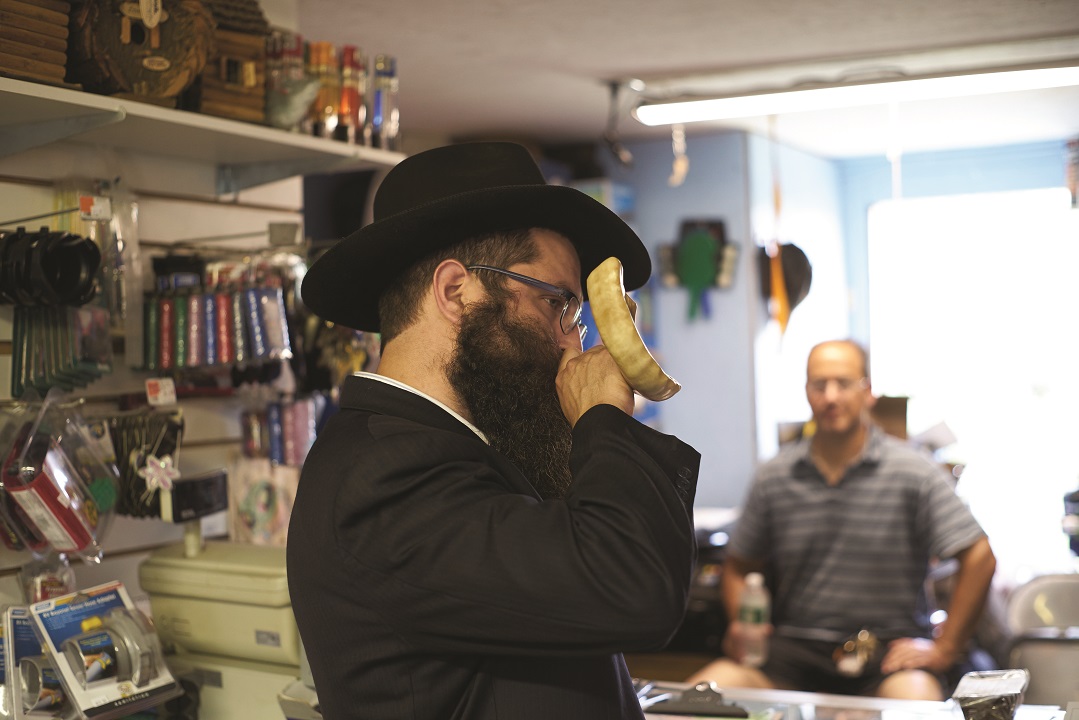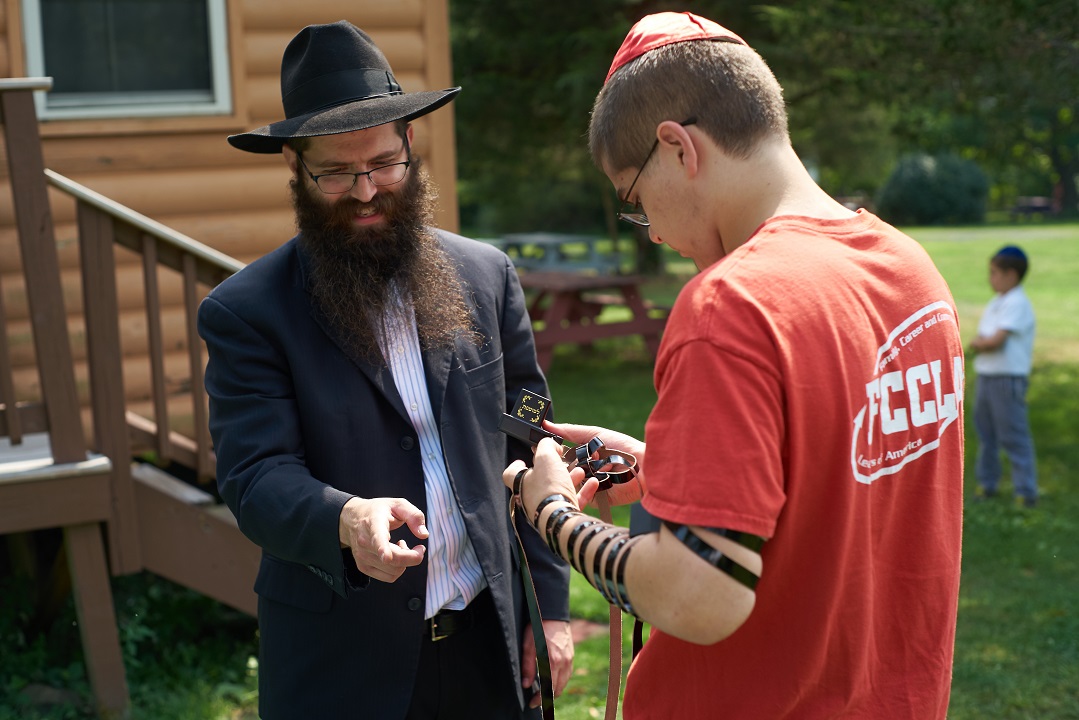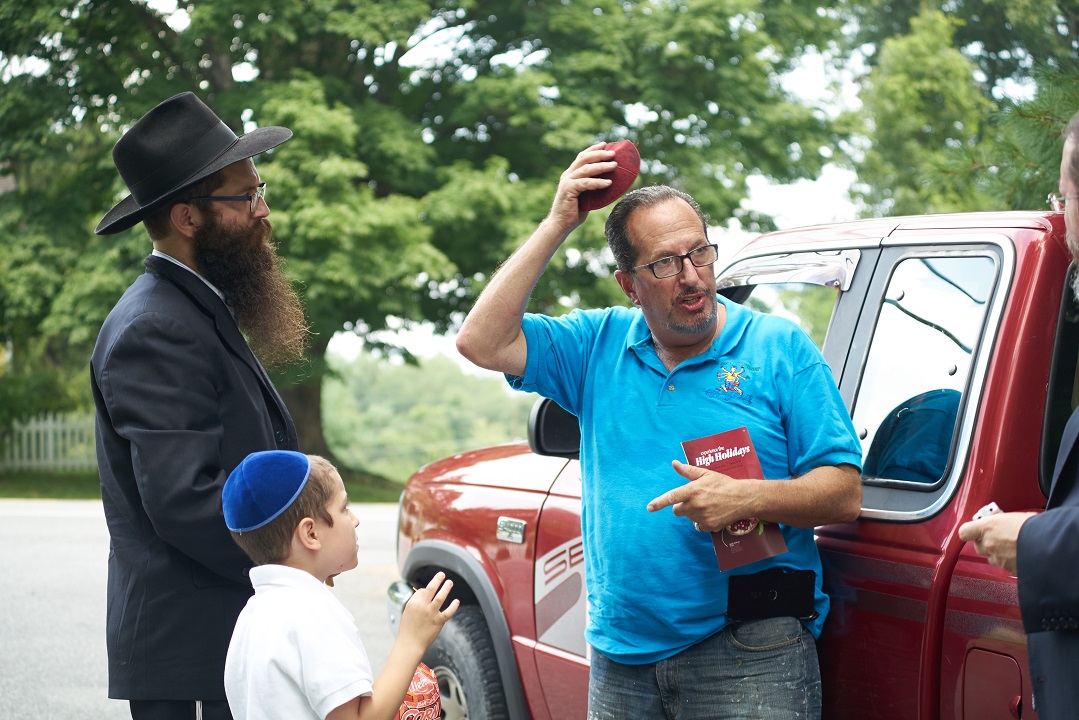In Search of the Hidden Yidden

For Rabbi Abie Iktin, summer’s end means one thing: Elul’s here, and he’s off to bring his lost brothers a taste of Yom Tov spirit

(Photos: Mordy Gilden)
A
s I make my way up the New York State Thruway toward Kingston a city of 20000 not far from the state capital in Albany the Baal Shem Tov is very much on my mind. Card-carrying Litvak I may be but stories of the legendary tzaddik and his talmidim setting out on a horse-drawn wagon in search of hidden Jews are an indelible part of my childhood Shabbos afternoon memories.
Ulster County isn’t White Russia and this sunny end-of-summer day isn’t the frigid winter setting of those tales; nor for that matter is the Best Western in town anything like the kretchmeh or inn that figures in every good chassidishe maiseh. But Rabbi Avrohom Boruch Itkin the dynamic Chabad shaliach who greets me as I pull into the parking lot at the Agudas Achim shul onKingston’sLucas Avenue would have been right at home on one of the Baal Shem’s journeys.
I’m here today to ride along on a wagon of his own which he has loaded up with everything he needs for a pre–Yom Tov hunt for the forgotten spiritually and sometimes physically needy Jews of upstate New York: a shofar a pair of tefillin and dozens of delectable miniature honey cakes and pamphlets introducing the upcoming Jewish holidays.
The 31-year-old Rabbi Abie (or A.B.) as he’s known all over these parts arrived in Kingston with Rebbetzin Binie nine years ago. Her brother Rabbi Yitzchok Hecht has headed the area’s lone Orthodox shul since moving here with Rebbetzin Leah on the fateful day of September 11 2001. Progress has been slow but steady — the latest news out of Kingston is that ground has been broken for a first-ever mikveh.
Itkin and Hecht are both iconic Crown Heights names — Rebbetzin Binie’s father Reb Shea is one of Chabad’s more colorful figures a well-known Crown Heights communal activist and a leader in working with disaffected Jewish youth particularly those ensnared in cults. He follows in the footsteps of his own father Rabbi J.J. who was also a leader in Jewish outreach and is best known as the decades-long radio voice of Lubavitcher farbrengens at 770 rendering the Rebbe’s talks into the King’s English for an audience of thousands.
As summer winds down lots of people are using this lazy hazy Monday to get in some last precious R&R before the crush of work school and the rest of real life re-intrude. But for Rabbi Abie summer’s end means only one thing: Elul’s here and with it a priceless opportunity to awaken Jewish hearts. This is one of four times each year — he makes a similar trek before Pesach Succos and Chanukah — that he packs up his car and heads out and about in Ulster and Greene Counties to connect with Jews and bring them a taste of Yom Tov spirit.
Along for today’s adventure is Rabbi Abie’s oldest Meir a bright-eyed nine-year-old who’s starting fourth grade at Albany’s Maimonides Day School. I can only imagine that a trip like today’s must do more for a little one’s sense of responsibility for fellow Jews than a year’s worth of lectures on the topic.

11 a.m. — Rosendale
We pull off the road and pile out of the wagon outside a neat, wood-frame country house bounded by lush fields as far as the eye can see. Gloria S., a widow in her early 70s, is a frequent visitor to the Kingston shul, but has been out of commission following surgery and is visibly delighted that the Itkins haven’t forgotten about her.
The rabbi turns to Meir. “Every time we drive by here, what do we all say? ‘Who lives there?’ Even little Henny knows…”
After some small talk and inquiries about her health and family, Rabbi Abie explains about Elul and the custom of daily shofar blowing. Then: “You’re ready, Gloria?” and without further ado, he stands outside her front door and launches into a powerful set of ten blasts, in keeping with Chabad custom, piercing the placid bucolic air for miles around.
It’s quite a sight to behold, and it occurs to me that there’s much more here than a ram’s horn concerto. It’s a very public announcement of “Here lives a Jew,” a shot-in-the-arm of unabashed Jewish pride that hopefully makes people comfortable with visible Jewishness. That, in turn, might make Jews who are used to blending into non-Jewish society more open to do more in the way of visible Jewish living.
The rabbi liberally peppers his chat with Gloria with phrases like “hashgachah pratis,” “a freileche yohr,” and “a gezunte yohr,” without bothering to translate. That, too, seems like part of the rabbi’s modus operandi of exposing people to someone who wears his Judaism on his sleeve authentically and unself-consciously.
Part of his mission, says Rabbi Abie, once we’re back in the car, is “to find all the Yidden who’ve come up here to hide, whether those living here full time for decades or the weekenders with vacation homes.” His posting to Kingston isn’t the Pittsburgh native’s first experience in a sparsely Jewish terrain: While still a bochur, he spent a year of shlichus in China, half a week in Hong Kong, and the other half in the mainland province of Guangzhou. So when Gloria remarks offhandedly, “I was stuffing envelopes for Federation and I was amazed at the number of Jews there are in [the nearby town of] Stone Ridge whom I’ve never met,” Rabbi Abie’s eyes visibly brighten — more “hidden Yidden” for him to ferret out and kindle the pilot light of their neshamos.

11:30 a.m. — Stone Ridge
The next stop is David’s Famous Falafel and Bodacious Bagels, whose proprietor, David D., is a stereotypical grizzled 60-something Israeli, Jerusalem-born but here since forever. Rabbi Abie wastes no time in heading straight behind the counter where David’s son Daniel, a paunchy 28-year-old who works for Dad, is sitting. “Heeey! How are you? You keep promising me you’re gonna show up to shul, but you haven’t shown up yet…”
Daniel knows exactly why the rabbi’s here. “We gonna wrap, you ready?” A bumper sticker forms in my mind: “Crown Heights — home of the rappers… and wrappers.”
On goes the kippah, out come the tefillin, with Rabbi Abie providing short explanations for everything. “We bind our heart and soul to G-d,” as he affixes shel yad and shel rosh and leads the young man, word by word, through the brachos on tefillin and the first perek of Shema.
Rabbi Abie next sets his sights on David, who’s been busily tending to a steady flow of hungry patrons. “David! Dakah, dakah bishvil tefillin.”
“Ein li zeman, ein li.”
Daniel tells his father he’ll take over the counter while he puts on tefillin, but David’s heart still needs some softening. The rabbi says, “David, during the whole month of Elul we blow the shofar to remind us to do teshuvah. I’m gonna blow and you listen. You’re ready? All you gotta do is smile.” And with that, he whips out the shofar and lets loose a kol gadol v’lo yasaf.
I’m busy trying to gauge the reactions of the customers on line, attired in summer casual, khakis and flip-flops, who just came in for a bagel and some whitefish salad but find themselves caught in an Orthodox Jewish ritual ceremony. It’s a mix of bemused half-smiles, nervous glances, and attempts, not entirely successful, not to stare at the guy behind the counter who looks like he just walked off the set of The Ten Commandments.
But once more, I get the sense that David likes what’s happening in his shop, because the rabbi is telling everyone within earshot what he himself can’t: I’m a Jew, from Israel to boot, and even if I’ve been holed up in this American hick town for years, I’m mighty proud of it.
The banter continues, first about Daniel. “David, send him to Eretz Yisrael for a month or two to learn Torah.” Daniel says he’d love to go on Birthright but it’s too late for him, he’s 28 and the program ends at 26. Next, about David’s wife, who’s not well; the rabbi tells Meir to write her name down, Devorah bas Chavah, for a Mi Shebeirach.
Then, with the store temporarily quiet, Rabbi Abie sees his opening: “Nobody’s here, David, let’s do tefillin. C’mon, so your wife should have a refuah. You know what’s beautiful? A few times ago, you were telling him, ‘Daniel, put on tefillin,’ when he didn’t want to. Now he’s pushing you to put them on.”
His words find their mark and David “wraps,” accompanied by a fluent brachah and Shema. He even corrects Rabbi Itkin’s “Yiddish Hebrew,” replacing “es” with “et.”
Before he goes, Rabbi Abie asks if they know of any other Jews who can use his services. David says, “Yesh poh od Yisraeli echad.”
“Mi, mi?”
“Kor’im lo Gidon.”
“Eifoh hu gar?”
“B’Accord.”
“A whole year or just the summer?”
“Kol hazeman. Rak lifnei chatzi sha’ah hayah kan.”
Like a New York detective just given a hot tip on the whereabouts of a “perp,” Rabbi Abie tells his sidekick, “Meir, write down ‘Gidon.’ ”
Back in the car, I ask Rabbi Itkin if he thinks he’ll end up locating Gidon. “I’ll have to get his address from them.”
“But they said they don’t have it.”
“I’ll get it.”
Does he ever get a curveball thrown at him? What if a girl would say to him, “I want to put on tefillin too?” He has a response at the ready: “That’s great, but let’s start with the stuff you’re supposed to do, like lighting Shabbos candles…”
Proceeding further down Main Street, Rabbi Itkin stops to drop off a Rosh Hashanah package at the door of a lady who once came to the shul in Kingston years ago, when they advertised a Jewish naming ceremony as a way to bring people through the door. They’ve never heard from her again, but once a Jew gets on Rabbi Abie’s list, he or she never leaves it. Then, offhandedly, he remarks, “Nisht doh kein farfallen — no one is left behind.” That, right there, is the animating force, the thread running through this whole day. Ki lo yidach mimenu nidach — it’s not just the lyrics for an Avraham Fried niggun, it’s the truth.
Next we’re on our way to Olive Bridge, but first, Rabbi Abie pulls into a parking lot outside a house bearing the words “Stone Ridge Town Library” and jumps out with Meir. Tekios in a bagel store are one thing, but a library? I wait this one out in the car with the photographer, with whom I share the story of the fellow who approaches a library checkout desk and asks loudly, “Can I please have a pastrami on rye?”
“Sir,” whispers the librarian admonishingly, “this is a library!”
“Oh, I’m so sorry,” he responds in a whisper, “can I have a pastrami on rye?”
The rabbi returns sooner than expected, because, as it turns out, he had only gone to make a honey cake drop, but the library doesn’t open until the afternoon.

12:30 — Olive Bridge
I get nervous when, on the way to our next visit on Bone Hollow Road (the name makes me nervous enough), Rabbi Abie asks me if I’m scared of dogs. I’m not particularly fond of them, especially not of the several large specimens of man’s best friend that he says are waiting for us at our next stop. But having signed up for this, I don’t have much choice at this point, do I?
We park outside a house in a state of severe disrepair; from what I can see through the front window, the same is true inside, if not worse. All around there are signs of a life once well-lived. A few yards from the house sit the ruins of an in-ground pool, now half-filled with a putrid brown soup; next to the front door is a rusted contraption that looks like it’s something used in the wine-making process.
We’re here to see Jerry R., a highly intelligent former psychologist whom the rabbi first met half a year ago when the former was gravely ill and near death. Never married, he has lived here for decades with his sister and a brood of canines that, Rabbi Abie says, “substitute for human interaction. He’s got a graveyard of old cars out back, and he told me the reason he holds onto them is that every time he threw out a car, one of his dogs died. The dogs are everything to him and they’ve got the run of the place. Meanwhile, I just used my connections from the summer camp we run to get him someone to repair his roof for cheap, because the leaks from it have begun to reach the main floor.”
Rabbi Itkin rings the bell repeatedly, which brings no response but gets the dogs inside barking wildly. At this moment, I can identify with the Ponevezher Rav, of whom they say that despite being a globe-trotting fundraiser, would think to himself as he rang a prospective donor’s doorbell, “I hope he’s not home.” As the rabbi deposits a honey cake on a chair outside and we take our leave, I silently breathe a deep sigh of relief.
To be in a line this demanding and sometimes, frustrating, one needs a healthy sense of humor, which Rabbi Abie has. He’s very altruistic, but also knows how to laugh at himself and the situations he finds himself in. On another brief stop where the homeowner didn’t answer repeated doorbell rings, he cracked us up by taking out the shofar for a tekiah because “maybe she’ll hear this one.” Pulling away from the house after leaving behind a honey cake, Rabbi Abie mused that we ought to drive back there in a minute to see if it’s still there.

1 p.m. — Route 209
For the next stop on Rabbi Abie’s schedule, we circle back to Stone Ridge to drop in on Glen G., a fellow in his 50s who’s very involved in the local Reform congregation and an erstwhile regular at Chabad’s Tuesday morning minyan. Once a week, men come together at Rabbi Hecht’s Agudas Achim to put on tefillin and daven Shacharis, followed by some learning and breakfast. It has the feel of a men’s club and leads to some of them getting more connected with other shul activities.
But a funny thing happens on the way to Glen’s place. As he zips down Route 209, the rabbi spies out of the corner of his eye a pickup truck peeking out from just off the road, its motor running, positioned like a cop car waiting for speeders. That split-second glimpse and what seems like a sixth sense for spotting a Jew is enough for Rabbi Abie to realize that sitting in the truck is Cary S., a local contractor whose sister is married to David the bagel maker. He makes a quick 180-degree swerve and pulls off the road to park behind Cary, who is on his cell phone.
As we hang around outside our car waiting for him to finish his call, I size him up as a tough customer, but once we get to talking, I see he’s just a sweet neshamah. Rabbi Abie inquires about how Cary’s sister Debra’s doing and tells him he’s already “wrapped” his brother-in-law David and nephew Daniel today. For some reason, however, he doesn’t suggest that Cary do the same but instead starts talking about shofar. “Cary, the reason we blow shofar during the month of Elul is that it wakes us up, it wakes our souls like a child crying and it breaks the heavens. So here we go, no blessings. Wanna stand for it?”
Cary gets out of his truck, and as he does, mutters something about someone trying to kill him for being a Jew.
“Someone tried to kill you ’cause you’re Jewish?!” Rabbi Itkin is incredulous.
But that’s apparently exactly what happened. “Back in December, I stopped at the Mobil station down the road to buy cigarettes and a coffee. A guy I never saw before comes up to me and starts spewing profanities, ‘You [expletive] Jews, you’re all the same. I’ll break your [expletive] jaw, I should kill you, you should all die.’
“I thought the guy was joking at first, but he kept on cursing, so I walked up to his car and said, ‘Y’know, you’re a racist, you oughta be ashamed of yourself.’
“So he says, ‘I’m gonna kill you,’ and he puts the car in drive and plows into me. Then — check this out — he backs up and hits me a second time.
“So I’ve got a fractured kneecap and a chipped bone, and it’s gonna need an operation, but in the meantime I’m on an anti-inflammatory. I keep working, because I have to, but I’m only at 75% and in pain. The whole thing was caught on the gas station’s videotape. The DA has it, and you can see it’s intentional, so they arrested him, but so far they only charged him with leaving the scene of a personal injury accident. I told them that he said ‘You’re Jewish and I’m gonna kill you,’ but the assistant DA tells me, ‘We never did a hate crime prosecution.’
“I said, ‘So what does that mean, you don’t prosecute cases like you’re supposed to?’ I’m really upset about this. I don’t care about the money, I just want this guy to go to jail.”
Rabbi Abie assures him that Chabad can be of great help with his case. They’ve got a relationship with the sheriff and the DA, and can also assist him in obtaining pro bono representation by a top personal injury lawyer.
It wasn’t just a traumatic experience, Cary tells us, but shook him as a Jew: “A week after this happened, I was in my living room watching a show about the 70th anniversary of the liberation of the concentration camps and I sat there crying. It was the first time in my life that I felt that here I was, a Jew, and it was happening here. I said I can’t believe this is happening to me.” Indeed, he admits that he’s scared to be standing here with us, because “I’m afraid someone’s gonna hit me again.”
“Nah,” replies the rabbi, “it doesn’t make a difference how religious or nonreligious you are. A Yid is a Yid, no adjectives.”
Having relived for us his personal Jewish wakeup call, Cary is open to listen to Rabbi Abie deliver one of his own with the shofar. Before beginning, the rabbi suggests, “Should we go to the Mobil station and do this? I’m serious,” but Cary would rather do it right where we are.
After shofar, Rabbi Itkin wraps Cary in tefillin and says the first parshah of Shema with him, and asks for his Jewish name, which is Chuna (Elchonon) Mendel, for a Mi Shebeirach. And with that, we take leave of each other.
“I’m so happy you guys found me here,” he says.
When we’re back in the “wagon,” I get a lesson in Yiddishe klugkeit. “The reason I asked him to stand up for shofar,” says Rabbi Abie, “is that once he’s out of the car, I could get tefillin on him. He wasn’t going to get out of his car for tefillin, that I knew, but once he’s already out of his car…”
In a position like his, Rabbi Abie has to be many things to many people: a mentor, a friend, a trouble shooter, a counselor, and more. And although he’s spent the morning dealing with adults ranging from their twenties to their seventies, he also has a knack for relating to perhaps the hardest-to-reach age group of all — the 20-and-below set. Later in the afternoon, we show up at an RV park owned by a 40-something couple with three sons ranging from college freshman to grade schooler. The boys are an ongoing project of Rabbi Abie’s; the older two came away from a Chabad teen Shabbaton in New York City inspired to put on tefillin daily and the youngest is a student in Chabad’s Hebrew school. The rabbi manages to deftly strike just the right tone with each.
From there it’s on to a nearby home, where a Jewish grandmother lives with her teenage grandson, Nick. It’s such a classic microcosm of the American Jewish experience: a woman who still remembers observant grandparents and a grandson who can’t tell an alef from a beis, now wandering together in the Jewish wilderness of small town America. How these two forlorn Jews ever got on Rabbi Abie’s radar screen, I have no idea, but I’ve learned to stop asking such questions.
It’s no mean feat to simultaneously stir the pintele Yid in an old-timer and a laconic teen, but Rabbi Itkin snaps into action at the challenge. He advertises the upcoming High Holiday services at Kingston Chabad: “You don’t need to be religious and it’s free, and you can stay over for the holiday.” He conducts a “mini-bar mitzvah” for Nick, which means wrapping him in tefillin and saying the Shema with him word for word — “Hey, he speaks fluent Hebrew!” And he offers to put up mezuzahs for Grandma — “to make your zeidy proud.” And, of course, the shofar sounds loud and clear here, as well.
Our last stop of the day is in Catskill, New York, a sleepy town where the pharmacy and the general store are sandwiched between pottery studios and pricey clothing shops that make the Manhattanites with weekend places around here feel at home. We walk up and then down Main Street, looking for Jewish storeowners.
But on this late afternoon, most businesses have closed for the day and the pickings are slim. During the frustrating half hour we spend going in and out of stores, Rabbi Abie takes it all in stride; his upbeat demeanor hasn’t dimmed noticeably since we set out on this trek six hours ago.
4:30 p.m. — Kingston
We head back to the Itkin homestead, a warm, lively Jewish home, replete with noisy kids, seforim-filled bookcases, and a large framed wall photograph showing the Lubavitcher Rebbe together with just two other people — Rabbi and Rebbetzin Itkin’s grandfathers. While still on the road, Rabbi Abie has asked Meir to call ahead for Mom to prepare something to eat. The repast that greets us when we walk through the door, a dining room table laden with Rebbetzin Binie’s delectable homemade dishes, could easily feed a contingent of ten.
And that’s when it dawns on me: These people, they’re not into kiruv, they’re into Jews. Hungry Jews, spiritually deprived Jews, whatever the need, they’re eager to address it — and eager to bring out the goodness that’s hidden in us all.
(Originally featured in Mishpacha Issue 627)
Oops! We could not locate your form.













